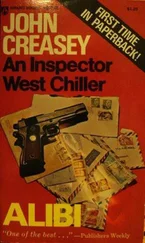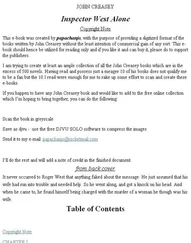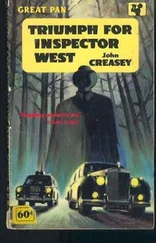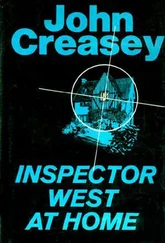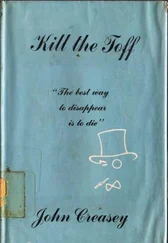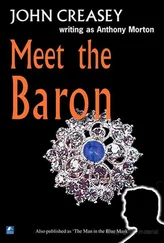John Creasey - Send Superintendent West
Здесь есть возможность читать онлайн «John Creasey - Send Superintendent West» весь текст электронной книги совершенно бесплатно (целиком полную версию без сокращений). В некоторых случаях можно слушать аудио, скачать через торрент в формате fb2 и присутствует краткое содержание. Жанр: Старинная литература, на русском языке. Описание произведения, (предисловие) а так же отзывы посетителей доступны на портале библиотеки ЛибКат.
- Название:Send Superintendent West
- Автор:
- Жанр:
- Год:неизвестен
- ISBN:нет данных
- Рейтинг книги:3 / 5. Голосов: 1
-
Избранное:Добавить в избранное
- Отзывы:
-
Ваша оценка:
- 60
- 1
- 2
- 3
- 4
- 5
Send Superintendent West: краткое содержание, описание и аннотация
Предлагаем к чтению аннотацию, описание, краткое содержание или предисловие (зависит от того, что написал сам автор книги «Send Superintendent West»). Если вы не нашли необходимую информацию о книге — напишите в комментариях, мы постараемся отыскать её.
Send Superintendent West — читать онлайн бесплатно полную книгу (весь текст) целиком
Ниже представлен текст книги, разбитый по страницам. Система сохранения места последней прочитанной страницы, позволяет с удобством читать онлайн бесплатно книгу «Send Superintendent West», без необходимости каждый раз заново искать на чём Вы остановились. Поставьте закладку, и сможете в любой момент перейти на страницу, на которой закончили чтение.
Интервал:
Закладка:
Roger took it. “I will,” he said. “Thank you.”
The tapping of Marino’s finger seemed like a warning of disaster; the little gesture, so deliberate and full of meaning, hovered in front of Roger’s eyes as he went out into the welcome cool of the evening. The gun made an unfamiliar weight in his pocket. He drove to the Yard but did not trouble to collect another gun. He went to the canteen with Sloan, had supper and made plans, as carefully as if he knew that Gissing would go to the house. After eight-thirty, when dusk was falling, he turned into Bell Street, Chelsea, where he lived. He would only have a few minutes, for he wanted to be at “Rest” by full darkness, but it would be better than nothing. The street looked friendly and pleasant in the fading light, and neighbours waved. He pulled up alongside the house, and walked up the path as Janet opened the front door.
“Darling! I didn’t think you were going to make it!”
“No faith in me,” Roger said. “That’s the trouble.” As they went indoors, he raised his head and sniffed. “No odours of frying. No noises of tape recorder or television. I deduce that my two sons are not at home.”
They turned into the front room, which was pleasant but just a little shabby, for most of the furniture had been here for over twenty years. But it had comfort and charm.
“Scoop’s out at some exhibition, they’re showing three of his African paintings,” Janet said. “And Richard rang up — he’s a chip off the old block, I’m afraid.”
“What’s he done that I wouldn’t do if I could help it?”
“Working overtime. He has to go out on location, or something, he sounded very excited.” Janet watched as Roger poured out a modest tot of whisky and splashed in a lot of soda, and he got the impression she was waiting for something.
“What are you going to have?” he asked, although she seldom joined him except on special occasions.
“Nothing,” she said.
He sipped and frowned.
“Then what —” he began, and suddenly he remembered. “God! What a clod I am! What did you buy?”
Her face lit up.
She had bought a suit in a blue-brown check which obviously she loved, and which she was sure was a bargain; he hadn’t seen her happier for a long time, and for a short while, as he watched her face, he forgot the Shawns, Ricky, Marino and even Lissa.
Twenty minutes later, in a very different mood, he left the car in a yard near “Rest” and walked along the side of the garden, under the trees towards the back door. No light showed. Plain-clothes police, patrolling the road, had signalled that no one had gone in. It could be, probably would be, a complete waste of time.
He let himself in with a key made at Scotland Yard’s workshop, modelled from the soap impression he had taken on his last visit to the house. Using only his flashlight he left the kitchen and looked into each room. Nothing had changed. There was a faded easy-chair in the hall, and at the far end, beneath the stairs, a cupboard used as a cloakroom, big enough for him to hide in. Even if the door were opened, he could squeeze back, out of sight. He sat in the chair and put a cigarette to his lips but didn’t light it. At first he found himself thinking of Scoop painting, and wondering what Richard, so much more intent and industrious, had been doing during the day on his scripts. His thoughts veered to Janet, then to Lissa Meredith. He found himself comparing them, in looks, in manner, and suddenly wrenched his thoughts away, to the missing Ricky and the dead Scammel.
Suddenly he heard a car approaching. Nearer it came, and nearer. He stood up as it stopped outside the house.
• • •
Roger waited by the front door, heard footsteps and retreated to the cloak-cupboard. He was inside, with the door open a crack, when a key turned in the lock. He couldn’t see who came in, but the footsteps were those of a man. He heard a faint cough; then the light went on by the front door, not bright enough to show anything here. As his eyes became accustomed to the crack of light, he saw a man of medium height, wearing a black Homburg hat and a raincoat of a darker shade than that worn by the man who had followed him at Hammersmith Underground that afternoon. He took off the hat and coat and Roger made ready to draw further back; but the man flung them on to the easy chair, threw his gloves after them and went into the drawing-room.
A pale-faced man of middle age; that fitted this man and Gissing. Roger didn’t move, heard the other walking about, fancied there was the chink of glass on glass. After a pause there came the unexpected, a bang of wood on wood followed by the rippling of fingers lightly touching the piano keys, then a melody, a familiar tune — I ’ m Gonna Wash That Man right out of my Hair. Its gaiety came to life, played well, as if the man enjoyed playing for its own sake. He went into other hits from South Pacific without pausing; he didn’t need music. It was so normal, so light-hearted, that it seemed to mock any suspicion.
The man began to sing lightly, voice and music filled the house. Tunes from My Fair Lady, Guys and Dolls , then further back — Annie Get your Gun and Oklahoma, all without a pause, as if the player had come here just to do this.
Where was the touch of the sinister?
The music stopped, and the silence seemed to hurt, to be false. Sounds of movement followed, the drawing-room door opened. Roger didn’t close the cloakroom door, he just drew back. The man walked towards him, and he held his breath. He couldn’t see what happened, but the door slammed, as if the man had pushed it as he passed. Darkness surrounded Roger. He waited a few seconds, then opened the door a crack, heard water running from a tap, and the man humming. He re-closed it but kept his ear to the keyhole. He knew when the man passed, gave him time to reach the drawing-room again, then opened it once more.
There could be deadly danger here, if the house held danger. Gissing — was it Gissing? — had noticed the door open once, would be suspicious if he saw it open again.
He had played enough to satisfy himself, apparently, and it was very quiet A clock struck ten. The chimes were light and clear, a friendly sound. As the last faded, Roger heard something else; another car.
He pulled the door so that it was almost closed, and he could only just see out. The old pattern was repeated — the slamming of a car door followed by footsteps. This time there was a sharp ring at the door bell. The pianist appeared, didn’t look towards the cloakroom, just opened the front door. He hid most of the newcomer, but wasn’t tall enough to hide David Shawn’s rugged face.
If the face were not enough, the gruff voice with its undertone of harshness supplied everything that was missing.
“Are you the man who called himself Jack?”
“Jack” — and it was “Jack” Gissing, thought Roger.
“I am,” said Gissing. His voice was pleasant and urbane, could easily have been the voice of the man who had telephoned Shawn at Wavertree Road. “David Shawn, I presume.” Laughter tinged with mockery lurked in the voice. “You must have shaken off anyone sent by the Embassy to follow you, or I would have had a telephone message by now. So we can talk freely. Come in.”
Shawn came in; Gissing wasn’t small, but he was dwarfed. He looked up at the big man, smilingly, suave, quite self-possessed, untroubled by Shawn’s hugeness. He closed the door. Shawn, without hat or overcoat, wearing the same grey suit that he had worn the previous morning, unruly hair roughly combed, face still like a piece of chiselled stone, looked down on him.
Roger couldn’t see Shawn’s eyes, but guessed what they were like; hot coals.
Читать дальшеИнтервал:
Закладка:
Похожие книги на «Send Superintendent West»
Представляем Вашему вниманию похожие книги на «Send Superintendent West» списком для выбора. Мы отобрали схожую по названию и смыслу литературу в надежде предоставить читателям больше вариантов отыскать новые, интересные, ещё непрочитанные произведения.
Обсуждение, отзывы о книге «Send Superintendent West» и просто собственные мнения читателей. Оставьте ваши комментарии, напишите, что Вы думаете о произведении, его смысле или главных героях. Укажите что конкретно понравилось, а что нет, и почему Вы так считаете.

